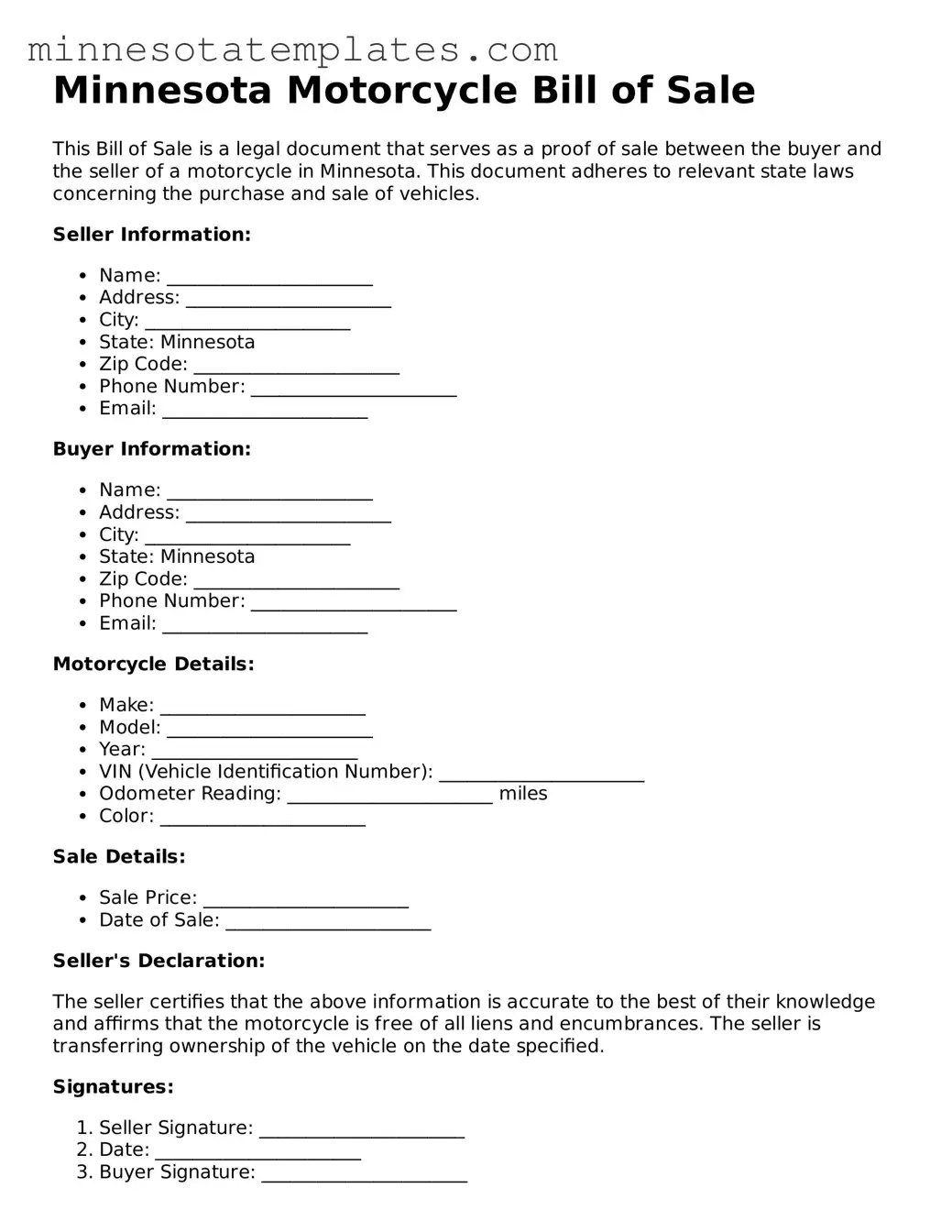Valid Motorcycle Bill of Sale Form for the State of Minnesota
The Minnesota Motorcycle Bill of Sale form serves as a crucial document in the process of buying or selling a motorcycle within the state. This form not only provides essential details about the transaction but also protects both the buyer and the seller by documenting the exchange. Key components of the form include the identification of the motorcycle, which encompasses the make, model, year, and Vehicle Identification Number (VIN). Additionally, the form requires the names and addresses of both parties involved in the transaction, ensuring that there is a clear record of ownership transfer. The sale price must also be indicated, along with the date of the transaction, which is vital for establishing the timeline of ownership. Furthermore, the form may include spaces for signatures, affirming that both parties agree to the terms outlined. By utilizing this form, individuals can facilitate a smoother transaction while adhering to Minnesota's legal requirements for vehicle sales.
Key takeaways
When dealing with the Minnesota Motorcycle Bill of Sale form, understanding its purpose and how to fill it out correctly is essential for both buyers and sellers. Here are some key takeaways to keep in mind:
- Purpose of the Bill of Sale: This document serves as a legal record of the transaction between the buyer and seller. It proves ownership transfer and can be crucial for registration purposes.
- Essential Information: Include details such as the motorcycle's make, model, year, Vehicle Identification Number (VIN), and the sale price. This information is vital for accurate record-keeping.
- Buyer and Seller Details: Clearly state the full names and addresses of both parties involved in the transaction. This helps establish who is responsible for the motorcycle after the sale.
- Signature Requirement: Both the buyer and seller must sign the document. Without signatures, the bill of sale may not be considered valid.
- Notarization: Although not required, having the bill of sale notarized can add an extra layer of authenticity and may be helpful in future disputes.
- Keep Copies: After completing the bill of sale, both parties should retain a copy for their records. This can be useful for future reference or in case of any legal issues.
- Registration: The buyer must use the bill of sale when registering the motorcycle with the Minnesota Department of Public Safety. This step is crucial to ensure legal ownership and compliance with state laws.
By following these guidelines, both buyers and sellers can navigate the motorcycle sale process smoothly and confidently.
Misconceptions
Understanding the Minnesota Motorcycle Bill of Sale form is essential for both buyers and sellers. However, several misconceptions can lead to confusion. Here are six common misunderstandings:
- It is not legally required. Many believe that a bill of sale is optional when buying or selling a motorcycle. In Minnesota, while it is not legally mandated, having a bill of sale is highly recommended to protect both parties.
- It must be notarized. Some people think that the bill of sale must be notarized to be valid. In Minnesota, notarization is not necessary, but it can add an extra layer of authenticity.
- Only the seller needs to sign it. Another misconception is that only the seller's signature is required. In fact, both the buyer and seller should sign the document to confirm the transaction.
- It is only for new motorcycles. Some individuals assume that the bill of sale is only relevant for new motorcycles. However, it is equally important for used motorcycles to document the sale and transfer of ownership.
- It does not need to include specific information. Many people think that a simple statement of sale suffices. In reality, the bill of sale should include details such as the motorcycle's make, model, year, VIN, and sale price to be effective.
- It is not necessary for private sales. Some believe that a bill of sale is only needed for dealership transactions. However, it is crucial for private sales as well to provide proof of ownership and protect against future disputes.
Addressing these misconceptions can help ensure a smoother transaction process for both buyers and sellers of motorcycles in Minnesota.
Other Common Minnesota Templates
Blank Bill of Sale - Eliminates ambiguity about what was sold and agreed upon.
When considering legal matters, understanding the necessity of a complete Power of Attorney document can be crucial for effective decision-making and representation. This form enables you to designate a trusted individual to handle your affairs, ensuring that your preferences are acknowledged during important situations.
Minnesota Residential Lease Agreement - This form often requires disclosure of the property's condition and any known hazards.
